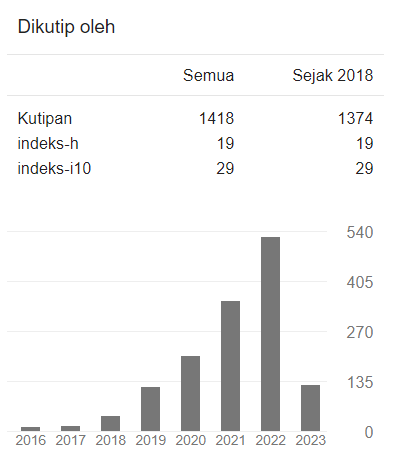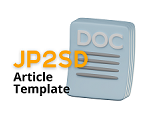Analisis Penilaian Kinerja Guru Menggunakan Metode Multifactor Evaluation Process Melalui Key Performance Indikators di SD Negeri 2 Selat Panjang
DOI:
https://doi.org/10.22219/jp2sd.v12i2.34801Keywords:
Penilaian Kinerja Guru, Metode Multifactor Evaluation Process, Key Performance IndikatorsAbstract
This research is driven by various issues related to the quality of teacher performance at SD Negeri 2 Selat Panjang, which include 1) the low educational qualifications of teachers who have not yet attained a bachelor's degree (S1/D4); 2) limited skills in writing and publishing scientific papers; 3) low participation and experience in academic forums; and 4) low levels of academic achievement among teachers. Therefore, this study aims to: 1) Analyze the results of a teacher performance evaluation using the multifactor evaluation process method through key performance indicators at SD Negeri 2 Selat Panjang, and 2) Develop strategies for improving teacher performance at SD Negeri 2 Selat Panjang based on the results of the multifactor evaluation process. This research employs a descriptive quantitative approach. The population consists of all 25 teachers at SD Negeri 2 Selat Panjang. Data collection techniques include field observation, expert opinion, performance assessment questionnaires, and the calculation of teacher performance levels, which are then analyzed descriptively. The results indicate that: 1) The performance scores of the 25 teachers at SD Negeri 2 Selat Panjang range from 20, categorized as very poor, to 40, categorized as poor; 2) The average scores for academic competence, academic achievement, professional development activities, and participation in scientific forums are 21.36, 6.00, 5.25, and 8.08, respectively; 3) The overall performance score of the teachers at SD Negeri 2 Selat Panjang is 40.68, categorized as poor; and 4) Enhancing teacher performance at SD Negeri 2 Selat Panjang requires collaborative efforts between the teachers and the principal.
Downloads
References
Ahmad, M., & Radji, D. L. (2023). Lingkungan Fisik dan Lingkungan Sosial dalam Menopang Kinerja Guru Ekonomi Madrasah Aliyah di Kabupaten Gorontalo Physical Environment and Social Environment in Supporting the Performance of Madrasah Aliyah Economics Teachers in Gorontalo Regency (Vol. 1, Issue 2).
Ahmad, S., Erwin, Y., Arafat, Y., & Lian, B. (2021). Program Pascasarjana Universitas Pgri Palembang. Januari-Juni, 6(1), 2021.
Arvianto, A., Zekben, M. S., Utami Handayani, N., Adi, P. W., & Saptadi, S. (2018). Pengembangan Indikator Kinerja Utama Untuk Mengukur Keberlanjutan Penelitian Pada Fakultas Teknik Universitas Diponegoro. Versi Cetak), 2(2), 263–274.
Awe, E. Y., Dantes, N., & Lasmawan, I. W. (2014). Hubungan Antara Kualifikasi Akademik, Kompetensi, Motivasi Kerja dengan Kinerja Guru Sekolah Dasar di Kecamatan Bajawa Kabupaten Ngada. E-Journal Program Pascasarjana Universitas Pendidikan Ganesha, 4, 1–13.
Bakar, A., Sanova, A., Yusnaidar, Y., & Ekaputra, F. (2022). Meningkatkan Keterampilan Guru SMAN 2 Sungai Penuh Dalam Mempublikasikan Artikel Ilmiah Ke Jurnal Bereputasi. Lumbung Inovasi: Jurnal Pengabdian Kepada Masyarakat, 7(4), 489–496. https://doi.org/10.36312/linov.v7i4.866
Darwis, D. (2019). Komparasi Metode Scoring System dan Profile Matching untuk Mengukur Kinerja Karyawan pada PT Wahana Rahardja. In Jurnal Komputasi (Issue 2).
Djemma, J. A., Pendidikan, J., Nur, I., & Mannuhung, S. (2022). Pelaksanaan Hak Dan Kewajiban Guru Berdasarkan Undang-Undang Nomor 14 Tahun 2005 Tentang Guru Dan Dosen Pada Upt Sma Negeri 1 Luwu Utara.
Edy Siswantoro, S. Kep. Ns. , M. K. (2023). Pengembangan model perilaku caring berbasis kecerdasan emosional terhadap peningkatan kompetensi mahasiswa keperawatan.
Fazriansyah, M. F. (2023). Efektivitas Model Discovery Learning Terhadap Kemampuan Komunikasi Matematik Peserta Didik. Jurnal Ilmiah Matematika Realistik (JI-MR, 4(2), 275–283.
Gilbert Simanullang, H., & Prima Silalahi, A. (2020). Sistem Kuesioner Penilaian Kinerja Guru Menggunakan Metode Multifactor Evaluation Process Pada Smp Negeri 3 Binjai Berbasis Framework Codeigniter. Universitas Methodist Indonesia Jl. Hang Tuah, 4(2).
Hajjah, A. (2019a). Sistem Penunjang Keputusan Rekomendasi Tenaga Kerja Menggunakan Metode Multi Factor Evaluation Process (Studi Kasus: STIKOM Pelita Indonesia). Jurnal Mahasiswa Aplikasi Teknologi Komputer Dan Informasi, 1(2), 110–114.
Hajjah, A. (2019b). Sistem Penunjang Keputusan Rekomendasi Tenaga Kerja Menggunakan Metode Multi Factor Evaluation Process (Studi Kasus: STIKOM Pelita Indonesia). Jurnal Mahasiswa Aplikasi Teknologi Komputer Dan Informasi, 1(2), 110–114.
Ibar Adi Permana. (2020). Analisis Penilaian Kinerja Dosen Menggunakan Metode Balance Scorecard (Studi Kasus Stt Sangkakala). http://journals.usm.ac.id/index.php/jreb
Rizky, M., Nugroho, A., Murtini, W., & Subarno, A. (2020). Pengaruh Praktik Kerja Industri Dan Efikasi Diri Terhadap Kesiapan Kerja Siswa Di Smk Negeri 3 Surakarta. Jurnal Informasi Dan Komunikasi Administrasi Perkantoran, 4(1). http://jurnal.uns.ac.id/JIKAP
Nurafni, K., Saguni, F., & Hasnah, S. (2022). Pengaruh Kinerja Komite Sekolah dan Kepemimpinan Kepala Sekolah Terhadap Peningkatan Mutu Pembelajaran Pendidikan Agama Islam. https://jurnal.uindatokarama.ac.id/index.php/jimpi/index
Putri, L. N., Muspawi, M., & Rahman, K. A. (2023). Peran Kepala Sekolah Dalam Meningkatkan Motivasi Kerja Guru Di Sma It Diniyyah Al Azhar Jambi. In JIPMuktj:Jurnal Ilmu Pendidikan Muhammadiyah Kramat Jati (Vol. 4, Issue 2). https://jurnal.pcmkramatjati.or.id/index.php/JIPMUKJT/index
Ramdhani, R. A., Rojabi, M. N., Mubarok, Moch. C., & Kholis, N. (2024). Eksplorasi Implementasi Laboratorium Fisika Berbasis Inquiry Di SMAN 1 Kejayan. MAGNETON: Jurnal Inovasi Pembelajaran Fisika, 2(2), 91–101. https://doi.org/10.30822/magneton.v2i2.3450
Sedtyadi, H., & Kartowagiran, B. (2014). Pengembangan Instrumen Penilaian Kinerja Guru Sekolah Dasar Berbasis Tugas Pokok dan Fungsi. Jurnal Penelitian Dan Evaluasi Pendidikan, 2(18), 290–304.
Shidqi, A., & Arifandi, D. (2020). Evaluasi Kinerja Guru.
Syaadah, R., Hady, M., Ary, A. A., Silitonga, N., & Rangkuty, S. F. (2022). Pendidikan Formal, Pendidikan Non Formal Dan Pendidikan Informal. 2(2), 125–131. https://jurnal.permapendis-sumut.org/index.php/pema
Downloads
Published
Issue
Section
License
Copyright (c) 2024 Suliana, Dewi Nasien, Sri Tatminingsih

This work is licensed under a Creative Commons Attribution-ShareAlike 4.0 International License.
Authors who publish with Jurnal Pemikiran dan Pengembangan Sekolah Dasar (JP2SD) agree to the following terms:
- For all articles published in Jurnal Pemikiran dan Pengembangan Sekolah Dasar (JP2SD), copyright is retained by the authors. Authors give permission to the publisher to announce the work with conditions. When the manuscript is accepted for publication, the authors agree to automatic transfer of the publishing right to the publisher.
- Authors retain copyright and grant the journal right of first publication with the work simultaneously licensed under a Creative Commons Attribution-ShareAlike 4.0 International License that allows others to share the work with an acknowledgment of the work's authorship and initial publication in this journal.
- Authors are able to enter into separate, additional contractual arrangements for the non-exclusive distribution of the journal's published version of the work (e.g., post it to an institutional repository or publish it in a book), with an acknowledgment of its initial publication in this journal.
- Authors are permitted and encouraged to post their work online (e.g., in institutional repositories or on their website) prior to and during the submission process, as it can lead to productive exchanges, as well as earlier and greater citation of published work (See The Effect of Open Access).

This work is licensed under a Creative Commons Attribution-ShareAlike 4.0 International License.


















